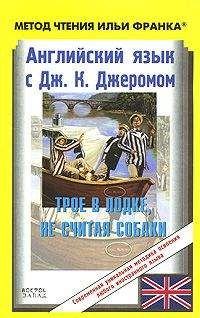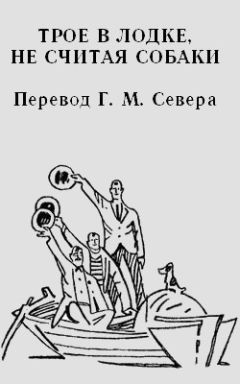Jerome Jerome - Английский язык с Джеромом К. Джеромом. Трое в лодке, не считая собаки
Harris, however, said he had done enough for a bit (Гаррис однако сказал, что сделал достаточно), and proposed that I should take a turn (и предложил, чтобы я сменил /его/; turn — /рабочая/ смена; перемена; короткий период деятельности; take a turn! — a ну попробуй!); so, as we were in, I got out and took the tow-line (поскольку мы были на берегу, я вылез и взял буксирный канат), and ran the boat on past Hampton Court (и повел лодку мимо Хэмптон-Корта; to run — бежать; плавать; направлять /судно/, вести, тянуть).
violence [ˈvaɪǝlǝns] consequence [ˈkɔnsɪkwǝns]
"What's that for? Why — "
No, on second thoughts, I will not repeat what Harris said. I may have been to blame, I admit it; but nothing excuses violence of language and coarseness of expression, especially in a man who has been carefully brought up, as I know Harris has been. I was thinking of other things, and forgot, as any one might easily understand, that I was steering, and the consequence was that we had got mixed up a good deal with the tow-path. It was difficult to say, for the moment, which was us and which was the Middlesex bank of the river; but we found out after a while, and separated ourselves.
Harris, however, said he had done enough for a bit, and proposed that I should take a turn; so, as we were in, I got out and took the tow-line, and ran the boat on past Hampton Court.
What a dear old wall that is that runs along by the river there (что за славная старая стена тянется там вдоль реки)! I never pass it without feeling better for the sight of it (я никогда не прохожу мимо нее, не чувствуя себя лучше от ее вида = мне всегда лучше от ее вида; without — без; без того, чтобы). Such a mellow, bright, sweet old wall (такая славная, веселая, очаровательная старая стена); what a charming picture it would make, with the lichen creeping here (что за прелестную картину она создает с этим лишайником, стелющимся здесь; to creep — ползти, стлаться), and the moss growing there (и этим мхом, растущим там), a shy young vine peeping over the top at this spot (робкой молодой лозой, выглядывающей сверху вот тут; to peep — выглядывать поверх чего-либо), to see what is going on upon the busy river (чтобы увидеть, что происходит на оживленной реке), and the sober old ivy clustering a little farther down (и спокойным старым плющом, вьющимся немного ниже; sober — трезвый; рассудительный, сдержанный; to cluster — расти вместе, группой; расти гроздьями, пучками; толпиться)! There are fifty shades and tints and hues in every ten yards of that old wall (полсотни оттенков и тонов /можно увидеть/ на каждых десяти ярдах этой старой стены; shade — тень; оттенок; tint — оттенок, тон, расцветка; hue — краска, оттенок, тон, цвет). If I could only draw, and knew how to paint (если бы я только умел рисовать и писать красками; to draw — чертить; рисовать; to paint — рисовать, писать красками), I could make a lovely sketch of that old wall, I'm sure (я бы сделал прекрасный эскиз/набросок этой старой стены, я уверен). I've often thought I should like to live at Hampton Court (я часто думаю, что хотел бы жить в Хэмптон-Корте). It looks so peaceful and so quiet (он выглядит таким мирным и тихим), and it is such a dear old place to ramble round in the early morning before many people are about (и это такое милое старое местечко, где /приятно/ побродить рано утром прежде, чем появится много народу = когда еще мало людей; to be about — быть поблизости).
But, there, I don't suppose I should really care for it when it came to actual practice (но я не думаю, что мне бы это действительно понравилось, если бы дошло до фактического осуществления = если бы это действительно случилось; to suppose — /пред/полагать, допускать, думать; practice — практика, осуществление /на практике/). It would be so ghastly dull and depressing in the evening (было бы ужасно скучно и уныло вечером), when your lamp cast uncanny shadows on the panelled walls (когда лампа бросает призрачные тени на обшитые панелями стены; uncanny — жуткий, зловещий; сверхъестественный; неосторожный), and the echo of distant feet rang through the cold stone corridors (отзвук далеких шагов разносится по холодным каменным коридорам; echo — эхо, отзвук, отголосок; to ring — звенеть, звучать; отдаваться эхом), and now drew nearer, and now died away (то приближаясь, то замирая; to draw near; to die away — затихать, гаснуть, увядать), and all was death-like silence, save the beating of one's own heart (и все — мертвая тишина, кроме биения сердца = лишь биение сердца нарушает мертвую тишину; own — свой, собственный).
lichen [ˈlaɪkǝn] hue [hju:] busy [ˈbɪzɪ]
What a dear old wall that is that runs along by the river there! I never pass it without feeling better for the sight of it. Such a mellow, bright, sweet old wall; what a charming picture it would make, with the lichen creeping here, and the moss growing there, a shy young vine peeping over the top at this spot, to see what is going on upon the busy river, and the sober old ivy clustering a little farther down! There are fifty shades and tints and hues in every ten yards of that old wall. If I could only draw, and knew how to paint, I could make a lovely sketch of that old wall, I'm sure. I've often thought I should like to live at Hampton Court. It looks so peaceful and so quiet, and it is such a dear old place to ramble round in the early morning before many people are about.
But, there, I don't suppose I should really care for it when it came to actual practice. It would be so ghastly dull and depressing in the evening, when your lamp cast uncanny shadows on the panelled walls, and the echo of distant feet rang through the cold stone corridors, and now drew nearer, and now died away, and all was death-like silence, save the beating of one's own heart.
We are creatures of the sun, we men and women (мы — создания солнца, мужчины и женщины). We love light and life (мы любим свет и жизнь). That is why we crowd into the towns and cities (вот почему мы толпимся в поселках и городах; town — /небольшой/ город, городское поселение; city — большой город), and the country grows more and more deserted every year (а деревня все больше и больше пустеет с каждым годом; country — деревня, сельская местность; to desert — покидать, оставлять). In the sunlight — in the daytime, when Nature is alive and busy all around us (на солнечном свете, в дневное время, когда Природа живет и /жизнь/ кипит вокруг нас; alive — живой; бодрый; busy — деятельный, оживленный; занятой), we like the open hill-sides and the deep woods well enough (нам нравятся открытые склоны холмов и густые леса; deep — глубокий; темный, густой; well enough — довольно хорошо): but in the night, when our Mother Earth has gone to sleep, and left us waking, oh (но ночью, когда наша матушка-земля уснула и оставила нас бодрствующими = а мы не спим — о)! the world seems so lonesome, and we get frightened (мир кажется таким пустынным, и мы пугаемся: «становимся испуганными»; lonesome — одинокий, пустынный), like children in a silent house (как дети в безмолвном доме). Then we sit and sob, and long for the gas-lit streets (тогда мы сидим и всхлипываем, и тоскуем по залитым светом газа = освещенным газовыми фонарями улицам), and the sound of human voices (и по звукам человеческих голосов), and the answering throb of human life (и по ответному биению человеческой жизни; throb — биение, пульсация). We feel so helpless and so little in the great stillness (мы чувствуем себя такими беспомощными и маленькими в глубокой тишине), when the dark trees rustle in the night-wind (когда темные деревья шелестят на ночном ветру). There are so many ghosts about, and their silent sighs make us feel so sad (вокруг так много призраков, и их беззвучные вздохи нагоняют на нас большую грусть: «заставляют нас чувствовать себя столь грустными»). Let us gather together in the great cities, and light huge bonfires of a million gas-jets (давайте же соберемся вместе в огромных городах, зажжем громадные костры из миллионов газовых рожков; gas-jet — газовый рожок, горелка), and shout and sing together, and feel brave (и /будем/ кричать и петь вместе, и чувствовать себя смелыми; brave — мужественный, смелый, храбрый).
frightened [ˈfraɪtnd] rustle [rʌsl]
We are creatures of the sun, we men and women. We love light and life. That is why we crowd into the towns and cities, and the country grows more and more deserted every year. In the sunlight — in the daytime, when Nature is alive and busy all around us, we like the open hill-sides and the deep woods well enough: but in the night, when our Mother Earth has gone to sleep, and left us waking, oh! the world seems so lonesome, and we get frightened, like children in a silent house. Then we sit and sob, and long for the gas-lit streets, and the sound of human voices, and the answering throb of human life. We feel so helpless and so little in the great stillness, when the dark trees rustle in the night-wind. There are so many ghosts about, and their silent sighs make us feel so sad. Let us gather together in the great cities, and light huge bonfires of a million gas-jets, and shout and sing together, and feel brave.
Harris asked me if I'd ever been in the maze at Hampton Court (Гаррис спросил, был ли я когда-нибудь в лабиринте в Хэмптон-Корте). He said he went in once to show somebody else the way (он сказал, что входил туда однажды, чтобы показать кому-то дорогу; to show the way — провести, показать дорогу). He had studied it up in a map, and it was so simple that it seemed foolish (он изучил его по карте, и он /лабиринт/ был таким простым, что казался глупым = был до глупости простым; map — карта, план) — hardly worth the twopence charged for admission (едва ли стоило платить два пенса за вход; to charge for — платить за). Harris said he thought that map must have been got up as a practical joke (сказал, что подумал, будто карту, должно быть, издали ради шутки; to get up — вставать; подготавливать, осуществлять; оформлять /книгу/; practical joke — /грубая/ шутка, розыгрыш), because it wasn't a bit like the real thing, and only misleading (потому что она ничуть не была похожа на настоящую вещь = на лабиринт, и только сбивала с толку; to mislead — вводить в заблуждение, обманывать). It was a country cousin that Harris took in (Гаррис взял с собой /в лабиринт/ одного родственника из провинции; country cousin — родственник из провинции, смотрящий круглыми глазами на город и городскую жизнь; cousin — кузен, кузина; родственник). He said:
"We'll just go in here, so that you can say you've been, but it's very simple (мы только зайдем сюда, чтобы ты мог сказать, что был /в лабиринте/, но он очень простой). It's absurd to call it a maze (нелепо называть его лабиринтом). You keep on taking the first turning to the right (все время сворачивай направо; to keep on — продолжать). We'll just walk round for ten minutes, and then go and get some lunch (мы прогуляемся десять минут, а потом пойдем позавтракаем)."



